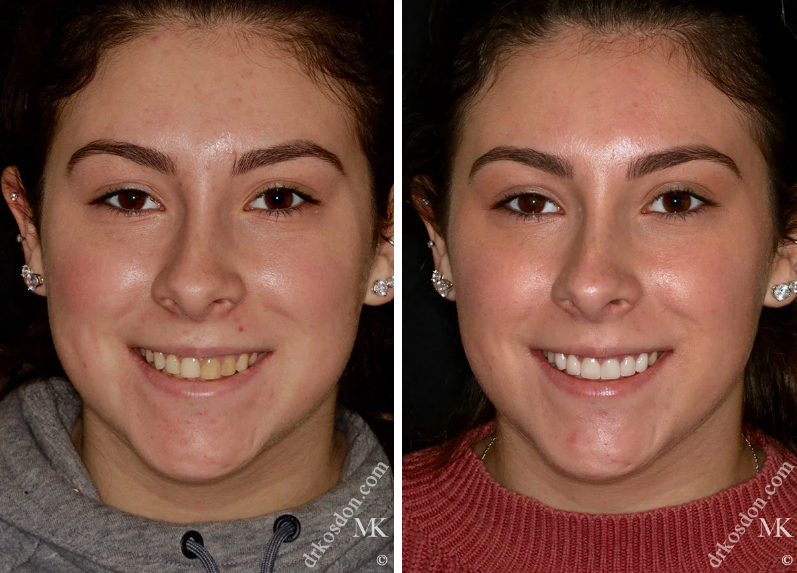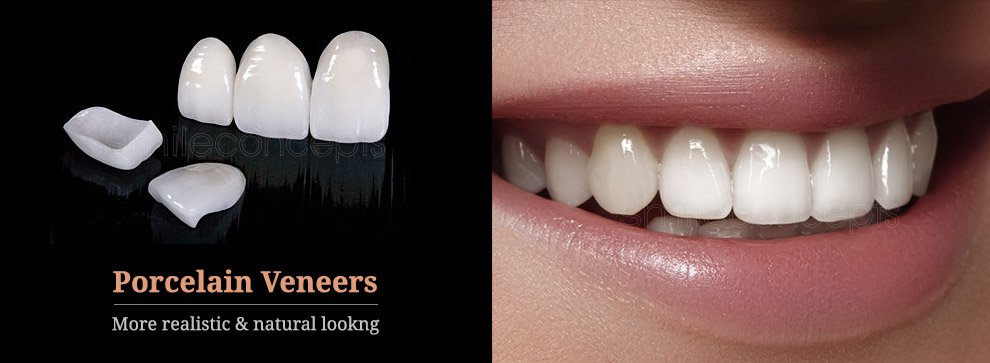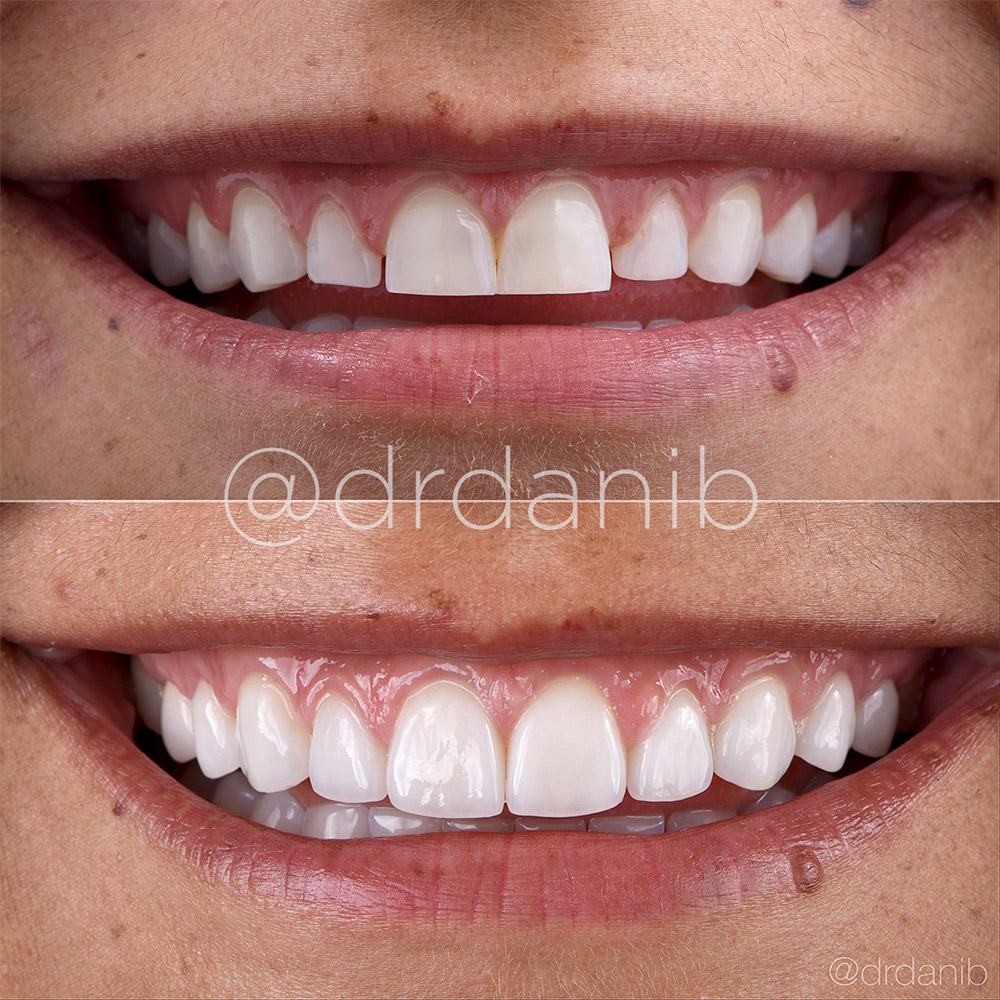What Are Veneers: Common Myths Debunked by Experts
Opening the Keys of Veneers: Facts, Kinds, and Advantages for a Gorgeous Smile
Veneers supply a compelling solution for those looking for to enhance their smiles. These oral improvements can deal with various blemishes, from discoloration to misalignment. With choices like porcelain and composite, people can select based upon their preferences and demands. Recognizing the nuances of veneers, including application and care, is vital. What factors should one take into consideration before making a decision? The answers may shock those interested in this aesthetic oral choice.

Recognizing Veneers: What Are They?
Veneers are thin, personalized coverings created to cover the front surface area of teeth, enhancing their look. Commonly crafted from long lasting materials, these shells are customized to fit each individual's teeth specifically. They serve several objectives, consisting of fixing visual blemishes such as discoloration, chips, or voids. The application procedure includes a dental professional preparing the teeth, commonly by getting rid of a percentage of enamel to ensure a snug fit. Once prepared, the veneers are bound to the teeth using a strong adhesive.
Individuals often select veneers for their capacity to develop a natural-looking smile while giving a long-lasting service to dental blemishes. Unlike various other aesthetic dental care choices, veneers require very little invasive treatments, making them a preferred choice. The outcome is a better smile that can significantly enhance a person's self-confidence and self-confidence. Generally, veneers offer an efficient strategy to attaining a more harmonious and attractive oral look.
Kinds of Veneers: Porcelain vs. Compound
When taking into consideration cosmetic oral choices, 2 primary sorts of veneers stand apart: porcelain and compound. Porcelain veneers are crafted from a durable ceramic material that resembles the natural look of teeth. They are known for their stain resistance and ability to reflect light in a similar way to natural enamel, providing an aesthetic allure that many clients desire. The application process generally entails more prep work of the tooth framework and might need several sees to the dentist.
On the other hand, composite veneers are made from a tooth-colored material that is straight related to the teeth. This type permits quicker application and can frequently be completed in a solitary go to. While they are less costly than porcelain veneers, they might not use the exact same durability or resistance to staining. Ultimately, the choice between porcelain and composite veneers depends on individual choices, budget, and certain oral demands.
The Advantages of Finding Veneers
Choosing veneers offers various advantages that can considerably boost both the aesthetic appeals and performance of an individual's smile. Among the primary advantages is their ability to remedy flaws such as staining, spaces, and misalignment, causing a more consistent look. Veneers can additionally boost the toughness of teeth, giving a protective layer that shields them from damage.
Additionally, they call for very little tooth preparation compared to other oral procedures, preserving more of the all-natural tooth structure. This conservation adds to a much healthier dental atmosphere while still attaining a stunning smile.
Veneers are extremely customizable, allowing people to pick the form, dimension, and shade that finest matches their choices. Furthermore, they are stain-resistant, making it less complicated to preserve a intense and eye-catching smile gradually. Generally, veneers provide an effective option for those seeking both cosmetic improvement and long-lasting oral health and wellness advantages.
The Veneer Application Process
The veneer application procedure entails several vital steps to guarantee perfect outcomes. An appointment is performed to analyze the client's requirements, followed by the prep work and shaping of the teeth. The veneers are bonded in location, with modifications made for an ideal fit and appearance.
Initial Appointment Steps
A comprehensive preliminary assessment is essential for anybody thinking about veneers, as it establishes the structure for an effective treatment. Throughout this meeting, the oral specialist reviews the person's oral health and wellness, discussing any kind of existing problems that could influence the veneer application. This analysis may include X-rays and an aesthetic assessment to identify the condition of the teeth and periodontals.
The dental professional also engages the client in a comprehensive conversation about their aesthetic objectives, preferences, and assumptions. They might offer different veneer options customized to the person's details requirements. Additionally, the expert discusses the treatment, prospective risks, and aftercare requirements, guaranteeing that the person is knowledgeable and comfy prior to continuing with the treatment.
Prep Work and Forming Teeth
After the preliminary consultation, the following stage includes the preparation and shaping of the teeth to fit the veneers. This vital step is executed by the dental expert, that very carefully assesses the tooth structure to determine the quantity of enamel that needs to be gotten rid of. Usually, a slim layer, normally around 0.5 millimeters, is slashed off to guarantee a correct fit for the veneers. Accuracy is critical throughout this procedure, as it affects both the visual outcome and the general convenience. As soon as the teeth are sufficiently formed, impressions are taken to produce personalized veneers that line up perfectly with the person's dental account. This thorough prep work sets the stage for an effective veneer application, boosting both look and feature.
Bonding and Last Adjustments
Complying with the shaping and prep work of the teeth, the bonding procedure starts, noting a vital phase in the veneer application. During this stage, a dental adhesive is related to the ready tooth surface, assuring a strong bond between the tooth and the veneer. The dental professional thoroughly places the veneer, making adjustments to achieve the wanted alignment and visual appeals. As soon as appropriately placed, an unique light is used to cure the glue, strengthening the bond. find here After curing, the dental expert performs final adjustments, cutting any excess product and refining the veneer's shape to guarantee an all-natural look. This mindful interest to information improves both function and visual appeals, adding to an overall gorgeous smile that is sturdy and resilient.
Taking care of Your Veneers: Maintenance Tips
Caring for veneers is important to keep their look and longevity. A regular day-to-day cleaning regimen, mindful avoidance of tarnishing foods, and regular dental exams are crucial elements of effective maintenance. These methods assist ensure that veneers remain in peak condition and continue to boost one's smile.
Daily Cleansing Routine
Frequently preserving veneers is essential for their longevity and appearance. A correct daily cleansing routine can assist preserve their sparkle and prevent damages. Dental practitioners suggest brushing two times a day with a soft-bristled toothbrush and fluoride toothpaste, making sure that all surfaces are cleaned delicately to avoid scratching the veneer surface. Flossing daily is also essential to get rid of food bits and plaque from between teeth, where brushes might not get to. In addition, making use of an antimicrobial mouthwash can aid preserve oral hygiene without hurting the veneers. It is a good idea to prevent rough cleaners and devices that can scratch the veneer. By following these straightforward actions, individuals can maintain their veneers looking stunning while promoting overall dental wellness.
Preventing Discoloration Foods
Veneers are designed to improve the appearance of teeth, their sensitivity to discoloring necessitates careful dietary selections. It is vital for people with veneers to be conscious of specific foods and beverages that can cause staining. Dark-colored products such as coffee, red white wine, and berry juices ought to be eaten in small amounts, as they are recognized to tarnish both all-natural teeth and veneers. In addition, acidic foods like citrus fruits canister weaken the bonding agents made use of in veneers, making them much you can try these out more vulnerable to staining. To maintain a bright smile, it is a good idea to wash the mouth with water after consuming discoloration foods and to exercise normal dental health. These thoughtful options add substantially to the see this website longevity and aesthetics of veneers.

Normal Oral Exams

Preserving the stability of veneers requires a dedication to normal oral examinations, as these consultations play an important duty in ensuring their longevity and look. During these check outs, oral specialists can examine the condition of the veneers, checking for any signs of wear, damages, or underlying oral issues. Additionally, regular cleansings help remove plaque and tartar that can collect around the veneers, advertising general dental health and wellness. Dental practitioners can additionally provide customized advice on treatment methods and items suited for veneer upkeep. By adhering to a timetable of examinations, individuals can address possible troubles early, guaranteeing their smile continues to be attractive and vivid. Ultimately, routine dental visits are a critical component of veneer treatment.
Is Veneers the Right Choice for You?
Choosing whether veneers are the right option typically hinges on private visual goals and oral requirements. For those seeking to attend to issues such as staining, chips, or imbalance, veneers can supply a transformative service. Prospects normally include people with healthy teeth however desire an enhanced smile.
Nonetheless, it is essential to consider aspects such as tooth enamel problem, the degree of oral concerns, and the willingness to maintain veneers - Porcelain Veneers Dentist. Consulting with an oral expert is necessary, as they can examine oral health and wellness and establish if veneers appropriate
Additionally, prospective prospects should assess the lasting commitment, as veneers may need replacement every 10-15 years. Price factors to consider also play a considerable role, as veneers can be a substantial investment. Ultimately, the decision must be well-informed, stabilizing visual needs with practical factors to consider for enduring outcomes.
Regularly Asked Inquiries
The Length Of Time Do Veneers Generally Last Prior To Requiring Substitute?
Veneers commonly last in between 10 to 15 years before needing replacement. Aspects such as oral health, way of living selections, and material high quality can affect their long life, making regular oral check-ups necessary for maintaining their problem.
Are Veneers Safe for People With Delicate Teeth?
Veneers can be safe for people with sensitive teeth, yet it commonly depends on the seriousness of sensitivity and the dental expert's method. Consulting an oral professional prior to continuing is important to ensure suitable results.
Can Veneers Be Eliminated or Replaced Easily?

Do Veneers Spot Gradually, and Just How Can I Prevent It?
Veneers can discolor gradually, especially from foods and drinks like coffee or red a glass of wine. To prevent discoloration, keeping excellent dental health, making use of a straw for drinks, and routine oral cleanings are recommended techniques.
What Is the Expense Array for Getting Veneers?
The price of veneers generally ranges from $500 to $2,500 per tooth, relying on variables such as material kind, dental professional experience, and location. Patients should talk to oral experts for customized quotes and funding alternatives.
When the teeth are effectively formed, perceptions are taken to produce customized veneers that align perfectly with the patient's oral account. Throughout this phase, a dental adhesive is used to the prepared tooth surface area, assuring a strong bond in between the veneer and the tooth. It is crucial to take right into account variables such as tooth enamel condition, the extent of oral problems, and the willingness to keep veneers. Veneers can be safe for individuals with sensitive teeth, but it often depends on the intensity of sensitivity and the dental practitioner's technique. The cost of veneers commonly ranges from $500 to $2,500 per tooth, depending on variables such as product kind, dental expert experience, and location.